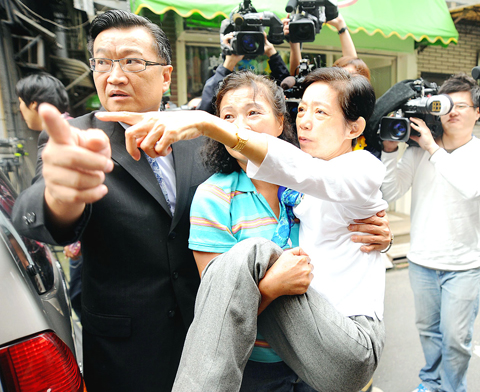The office of former president Chen Shui-bian (陳水扁) yesterday expressed regret over the connection between Chen and a lawsuit filed by Taiwanese activist Roger Lin (林志昇), saying the former president would never meet Lin again or sign any paper he issues.
In a statement issued yesterday, Chen's office said the former president endorsed Lin's lawsuit because he thought it could help clear up Washington's position on Taiwan's status and its Taiwan policy.
It said Chen understood that Lin’s lawsuit had been going on for many years and that it had nothing to do with the former president's legal problems.

PHOTO: CHU PEI-HSIUNG, TAIPEI TIMES
“The connection between Lin's lawsuit and the former president's legal cases has caused Chen much trouble,” the statement said. “The former president feels puzzled and regretful about it. He has decided never to see Mr Lin again or sign any more documents.”
Chen also disagreed with Lin using his name to ask for donations, the statement said.
Lin petitioned a Washington district court in October 2006 to rule on the nationality of the people of Taiwan. He wanted the US court to decide what rights the Taiwanese have under the San Francisco Peace Treaty and the US Constitution, including whether they should be issued US passports.
Lin said the treaty did not address sovereignty over Taiwan and Penghu, and that the US was therefore still the principal occupying power. The court dismissed the case, saying it lacked jurisdiction over political matters.
On appeal, Lin argued that the US was Taiwan’s “principal occupying power,” effectively giving the US temporary de jure sovereignty. When permanent sovereignty is ultimately decided, Lin said, the de jure sovereignty of the US would cease.
The US Court of Appeals in Washington upheld the district court’s ruling that deciding sovereignty was a political task rather than a judicial question. As the executive branch of the US government has remained silent on this issue, the court said, it could not intrude on its decision.
Lin appealed to the US Supreme Court on July 8 this year.
The case took an unusual twist last month when Chen signed an affidavit in support of Lin's lawsuit. In the affidavit, Chen said the US has been the “principal occupying power” of Taiwan and that he would like to clarify in court the relationship between “the people of Taiwan (not the 'exiled Chinese' on Taiwan) and the United States.”
The US Supreme Court declined to hear Lin's case earlier this month.
Separately, Chen petitioned the US Court of Appeals for the Armed Forces late last month after he was sentenced to life imprisonment for corruption.
Chen said in an English declaration he signed that during his eight-year presidency, the US executive branch often made decisions for the people of Taiwan without consulting them. These affected the lives, liberty and property of Taiwanese and the nation's territory.
Under the 1952 San Francisco Peace Treaty, Chen said it is clear that Taiwan was not awarded to the Republic of China and thus remains under the US Military Government until that government is legally supplanted.
Lin, who said his organization was sponsoring the legal action for Chen, demanded Chen's immediate release from incarceration and full respect for Chen's civil rights.
Lin, however, focused on Chen's argument in the affidavit concerning Taiwan's international status and dismissed speculation that the suit was aimed at resolving Chen's legal problems.
The US Court of Appeals for the Armed Forces declined to hear Chen's case a few days after the US Supreme Court rejected Lin's case.

Several Chinese Nationalist Party (KMT) officials including Chairman Eric Chu (朱立倫) are to be summoned for questioning and then transferred to prosecutors for holding an illegal assembly in Taipei last night, the Taipei Police said today. Chu and two others hosted an illegal assembly and are to be requested to explain their actions, the Taipei City Police Department's Zhongzheng (中正) First Precinct said, referring to a protest held after Huang Lu Chin-ju (黃呂錦茹), KMT Taipei's chapter director, and several other KMT staffers were questioned for alleged signature forgery in recall petitions against Democratic Progressive Party (DPP) legislators. Taipei prosecutors had filed

Taiwan would welcome the return of Honduras as a diplomatic ally if its next president decides to make such a move, Minister of Foreign Affairs Lin Chia-lung (林佳龍) said yesterday. “Of course, we would welcome Honduras if they want to restore diplomatic ties with Taiwan after their elections,” Lin said at a meeting of the legislature’s Foreign Affairs and National Defense Committee, when asked to comment on statements made by two of the three Honduran presidential candidates during the presidential campaign in the Central American country. Taiwan is paying close attention to the region as a whole in the wake of a

President William Lai (賴清德) has appointed former vice president Chen Chien-jen (陳建仁) to attend the late Pope Francis’ funeral at the Vatican City on Saturday on his behalf, the Ministry of Foreign Affairs said today. The Holy See announced Francis’ funeral would take place on Saturday at 10am in St Peter’s Square. The ministry expressed condolences over Francis’ passing and said that Chen would represent Taiwan at the funeral and offer condolences in person. Taiwan and the Vatican have a long-standing and close diplomatic relationship, the ministry said. Both sides agreed to have Chen represent Taiwan at the funeral, given his Catholic identity and

Lawmakers from the Democratic Progressive Party (DPP) yesterday established a friendship group with their counterparts in Ukraine to promote parliamentary exchanges between the two countries. A ceremony in Taipei for the Taiwan-Ukraine Parliamentary Friendship Association, initiated by DPP Legislator Chen Kuan-ting (陳冠廷), was attended by lawmakers and officials, including Deputy Minister of Foreign Affairs Francois Wu (吳志中) and European Economic and Trade Office in Taiwan Director Lutz Gullner. The increasingly dire situation in Ukraine is a global concern, and Taiwan cannot turn its back when the latter is in need of help, as the two countries share many common values and interests,